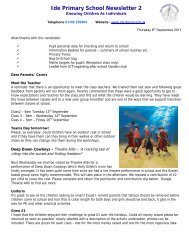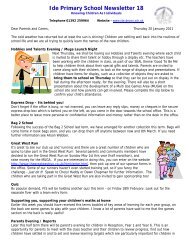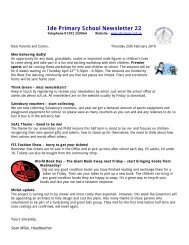SEAL - Aiming High, Achieving Goals - Ide Primary School
SEAL - Aiming High, Achieving Goals - Ide Primary School
SEAL - Aiming High, Achieving Goals - Ide Primary School
Create successful ePaper yourself
Turn your PDF publications into a flip-book with our unique Google optimized e-Paper software.
Social and Emotional Aspects of Learning –<br />
Theme 3<br />
Every success story begins with a dream. We see ourselves winning X-factor,<br />
being slim, getting the perfect job, becoming Prime Minister or successfully<br />
completing that marathon. Sadly, not every dream ends in a success story.<br />
<strong>Achieving</strong> our ambitions and goals depends on a number of skills and<br />
qualities. We have to be able to motivate ourselves and to have a good plan<br />
(breaking down the goal into manageable targets). We have to be able to<br />
stick at it even when it’s hard (persistence) and learn to bounce back when<br />
things go wrong (resilience). Without these skills, our goals will remain vague<br />
dreams which we sit back and hope will ‘happen to us’ one day.<br />
In this theme, children learn to take responsibility (when things turn out well<br />
and when they don’t), to motivate themselves to set goals, to make a plan, to<br />
think about overcoming obstacles, to keep going and to get over frustrations<br />
and disappointment.<br />
The skills and qualities developed through ‘<strong>Aiming</strong> <strong>High</strong><br />
and <strong>Achieving</strong> <strong>Goals</strong>!’ are not just important for school<br />
learning – they are important throughout life, and also<br />
highly valued by employers.<br />
Helping your child to motivate themselves<br />
We all want our children to motivate themselves (we<br />
don’t want to be giving them stickers for getting out of<br />
bed when they are grown-up!).<br />
Let children choose their own goals – we are all more likely to stick at things<br />
we really want to do.<br />
Remember that we learn the same skills whatever the goal we set ourselves –<br />
your child will learn as much from achieving the goal of mastering a<br />
complicated skate-board manoeuvre as they will from having a goal to<br />
improve their spelling. Luckily the skills are naturally generalised to other<br />
areas of life.
Helping your child to keep going and to bounce back (to develop<br />
persistence and resilience)<br />
Persistence is the ability to grit our teeth and see something through to the<br />
end.<br />
To help your child to keep going for longer, set a period of<br />
time with them to work on something – just a little bit more<br />
each time (but remember it is hard to concentrate when we<br />
are tired or stressed, to be flexible!). Use a sand-timer or<br />
stopwatch so they can see their progress. Reward success<br />
with praise and maybe on a chart that shows their progress.<br />
<strong>Achieving</strong> a goal often means waiting for what we want, and not giving in to<br />
the desire or impulse to do something more fun or immediately rewarding (to<br />
‘delay gratification’). Look for occasions to praise them when they do do this,<br />
and model doing it yourself.<br />
Help your child to feel safe to try new things. Let them know that it doesn’t<br />
matter if they get it wrong – always praise them for trying. If we ridicule or<br />
punish children for their mistakes, they will not want to take a risk or try<br />
something new – they will stick with what they know they can do.<br />
Encourage your child to keep going when they feel bored or frustrated –<br />
remind them to their goal (the big picture), encourage them to ‘just do five<br />
minutes’ and see how they feel, or suggest that they take a break, do<br />
something different and go back to it later.














